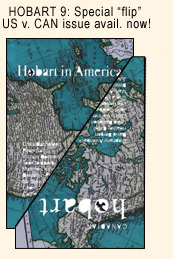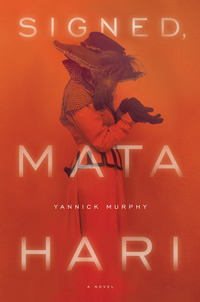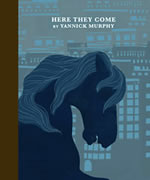|
|||||||||||||
| archives | submissions | blog | (dis)likes | ||||||||||
 |
|||
 |
|||
|
I Speak Spanish... |
|||
|
Words End Here |
|||
|
From Laura's Pocket Guide... |
|||
|
Four Stories |
|||
|
Yannick Murphy |
|||
|
Yannick Murphy is the author of the novels, Signed, Mata Hari, Here They Come, and The Sea of Trees. Her story collections include Stories in Another Language and In a Bear's Eye. Her children's books include Ahwoooooooo! and Baby Polar (which is forthcoming in 2008/2009). She is the recipient of various awards including a Whiting Writer's Award, a National Endowment for the Arts award, a Chesterfield Screenwriting award and her story In a Bear's Eye was recently published in the 2007 O'Henry Prize Stories. Angela Jane Fountas writes, teaches, and runs WriteHabit.org. She is also a volunteer at 826 Seattle. Her work has appeared in Quick Fiction, Sentence, Redivider, The Bitter Oleander, Monkeybicycle, Diagram, Syntax, and elsewhere. She has been awarded grants from 4Culture and the Office of Arts & Cultural Affairs in Seattle and was a 2006 Jack Straw Writer. Angela earned her MFA in creative writing from the University of Alabama and recently finished her first short story collection. |
|||

 |
 |
I discovered Yannick Murphy through her Bookworm interview and bought a copy of Here They Come (McSweeney's Books, 2006) soon after. I've read it twice already and know that this is a book I'll return to again and that Hobart fans are sure to love. When Yannick's newest novel came out, Signed, Mata Hari (Little, Brown and Company, 2007), I snapped it up.
Yannick and I corresponded during March and April 2008, focusing on the two novels above and writing autobiographically as well as biographically. She has a brand-new collection of short stories that just came out this year: In a Bear's Eye (Dzanc Books, 2008).
In a Publishers Weekly interview you said that Here They Come is "very autobiographical." And in a Bookslut interview you said that for Signed, Mata Hari , "I tried not to do a lot of research because I knew that would be the one thing that would kill my imagination."
Was the role of the imagination different when writing Here They Come compared to writing Signed, Mata Hari ?
I always try to draw on some kind of personal experience when writing, I do this because it makes the work more interesting for me to write and it adds to the passion, pressure, and authority of a piece. I didn't have to research for Here They Come, I had lived that squalid life in New York, but I let my imagination run freely, the same as I did when I wrote Signed, Mata Hari . At one point in Here They Come the father disappears off to Spain. This didn't happen in my life, but my father did decide to leave my family, and we were not in touch for long stretches at a time.
In the book it made perfect sense for the thirteen-year-old narrator to imagine the father disappearing off to Spain, it felt natural to present it that way and I was able to recall all the same emotions I felt as a girl whose father had left the family. Just because a young girl is faced with a harsh reality, it doesn't mean her imagination is in any way stymied, in contrast, the reverse is true, and she'll let her imagination take off just to preserve her sanity and make sense of her circumstances.
The research that I did for Signed, Mata Hari acted as little springboards for my imagination, and I jumped from scene to scene, sometimes relying on those facts to help me build a framework for the book in which the reader could be presented with images, rather than be told what the meaning of the story was or what the emotions of Mata Hari were. For example, I knew some facts. I knew she had been in prison, I knew she had been in Indonesia, and I knew she lived in Europe and was an exotic dancer. Alternating among those places sent the novel into forward motion, I filled in the blanks with my imagination. A more heavy reliance on actual facts would have weighed the story down, instead of lifting it up. Too much news and information can be a form of negative energy.
Both novels are based on real lives, the first, your own life, and the second, the life of a historical figure. The worlds of both narrators — the thirteen-year-old nameless narrator of Here They Come as well as Mata Hari — existed before these books. I found both worlds engaging and believable — and as a reader I felt completely transported, which is always a thrill.
How did you go about accessing each world? How much did memory help you create the fictional world of your thirteen-year-old narrator? And how much of what you knew about Mata Hari's life help you create her fictional world?
I believe that any time you describe an event that occurred you are telling a fiction. Humans are just too creative and too playful not to enjoy adding some detail or embellishment to a fact so that the listener is entertained and so that the story becomes a more interesting event and so that it sounds like it's being unraveled right before the listener for the very first time. I did rely on memory to write Here They Come, but I also made the most out of what I could do with the fiction so that
sentences, instead of piling up on top of each other, leaned against each other, and gave the story meaning.
It was what I didn't know about Mata Hari's world that I drew upon when I wrote Signed, Mata Hari because I delighted in filling in those gaps with my imagination. For example, I knew from research that Mata Hari went with her husband to Java and that they had an unhappy marriage there, but I was never really sure of actual scenes or arguments that may have taken place between Mata Hari and her husband. When I left it up to my imagination, I envisioned them arguing about her total absorption of Javanese culture that later influenced her style as a famous exotic dancer, and so it was natural to create scenes where they argued about her desire to wear traditional sarongs, to embrace and believe the folklore of the islanders, to want to eat the food they ate, and to even take on a Javanese name — Mata Hari, which means the sunrise.

I'm glad you mentioned the part in Here They Come where the father disappears and the narrator's brother and the slut, the father's girlfriend, go to Spain to find him. At first, it seems, the narrator is able to tell the reader about the search via letters from her brother, but it soon becomes clear that she is telling the reader things that she is not privy to at all.
It was such a thrill for me when I reached that part of the book. I love when writers break so-called rules and it works. (The "rule" in this case being what a first-person narrator can and cannot know.) And yet in many ways, no rule is being broken. As a child, and still, I imagined stories of my own life, days past and days to come. For me, Here They Come is truer because the narrator fills in the blank of her missing father to make her story more whole.
Having read all of your books to date, it's clear that you are aware of the so-called rules and not really concerned with them, which, for me, makes your writing all the richer and more original. What frees you from the rules?
I don't like being burdened by conventional ways of being on the page. I think there are so many ways that people see things and how they interact with each other that are not expressed in writing simply because writers are so caught up with being "polite" on the page. Once we get a little mongrel, and really try to portray things as they appear, not how the writer would like them to sound, then new possibilities open up.
For example, so much of writing today provides the back-story for a character, and pages are devoted to it, but I just don't have the patience for it, either as a reader or a writer. I like to dive right into a situation, the reader will learn who that person is not by what I've described to them about their past, but by what situations I chose to have the character experience in order to move the story forward. This diving-in method makes the story seem to unfold as I'm reading it, and I come into being while the story comes into being.
In Signed, Mata Hari , the first-person narrative is punctuated by third-person chapters of Mata Hari in prison. This alternation between first person and second person and between the present action of the story and the future action, all told in past tense, creates a rhythm. How did this structure come about? And who, in your mind, is the narrator for the third-person sections? Or does this matter? (It didn't matter to me as a reader.)
The structure for Mata Hari came about because I kept my ear open and was listening to what I had written in my prior sentences. For example, I started in first person when Mata Hari was young, but then I realized that the voice of Mata Hari as an older woman who had been around the world would be a little wiser, a little savvier, and the text itself begged for this new view of her, and this new voice of her as well.
Then it became natural for me to include a view of her that wasn't her own, and so I incorporated the third person as well. I felt that it was only fair to the reader to have an outside, third person perspective of her. I didn't have anyone in mind for the third-person sections, but if I had to choose who it was, I would say it was the doctor who treated her while she was in prison, or the nun who came to visit her, they were sympathetic to her predicament.
Here They Come is delivered via present tense, and Signed, Mata Hari is delivered via past tense. Both feel completely right to me. The use of present tense put me right there with your thirteen-year-old narrator in her beautifully harsh magical world. And the past tense felt completely right for the retelling of Mata Hari's complicated life. Was the tense for each a conscious choice or is that just how each story came out when you sat down to write?
Here They Come came out in a pressure-filled rush. There was no other way to write it except fast and furious, and there was no other way to write it except in the present tense, because I just felt that the narrator, being thirteen years old, would have no cognizant need to address the past or consider the future. When you're that young, it's what's going on in the present that holds the most meaning and the most danger.
Signed, Mata Hari came out in the past tense because I knew when I started the novel that I was going to span so many years of her life. Her early years were too interesting, too filled with spiritual, artistic, moral and intellectual travel not to include in the book. It was her past that influenced her future and made it possible for me to envision why and how she let herself get involved in espionage and eventually face a firing squad.
Can you say more about this: "I kept my ear open and was listening to what I had written in my prior sentences."
You said something similar in your Bookworm interview regarding your writing process: "Listening to where those sentences want to go next and making sure that they follow from the very first sentence, the very first feeling of the sentence is there, all throughout and is constantly changing and taking turns you didn't expect them to take. That for me is the excitement of the writing."
If I'm always addressing what I said in my prior sentences then I'm forming something that has a sense of accrual, rather than a linear effect. In Signed, Mata Hari the first sentence is "I cheated death." I then say how Mata Hari believes she cheated death. As long as I kept that thread running through the book and came back to it so that every time I came back to it I revealed a different angle of it, then I created something with relevance, otherwise it would have only been a comment dangling in the text. As the book progresses, we learn that Mata Hari holds on to the idea that she believes she can cheat death, and it is in fact this naïve attitude that enables her to go forward and be strong in the face of a failed marriage, the loss of her children, poverty, and a trial for espionage.
If I didn't keep juggling and re-introducing images and concepts, then writing wouldn't be any fun for me. Writing is pattern making with a set of shapes and images that you lay on the table in the first few pages of the fiction, then you have the entire rest of the book to show the infinite numbers of patterns you can make using those same shapes and images. When you're finished with the book and you step back from the patterns, you've got an entire object, a quilt of storytelling.
When writing this way, do you revise sentence by sentence or just let the sentences pour out and go back to refine later?
I try to get each sentence right before I go on, but sometimes I am thinking in a rush and it's more important to type as quickly as I'm thinking in order to get the nugget of the idea on the page, as well as the rhythm and cadence of the riff, then later I can go back and hone it to get it right.
In closing, what advice would you give to "young" writers who are writing a fiction based on a real life, either their own or another's?
One of the most important things to remember, maybe, is to make sure to tell your story in a way that hasn't been told before, because really there are no new stories, there are just new ways of telling them.
